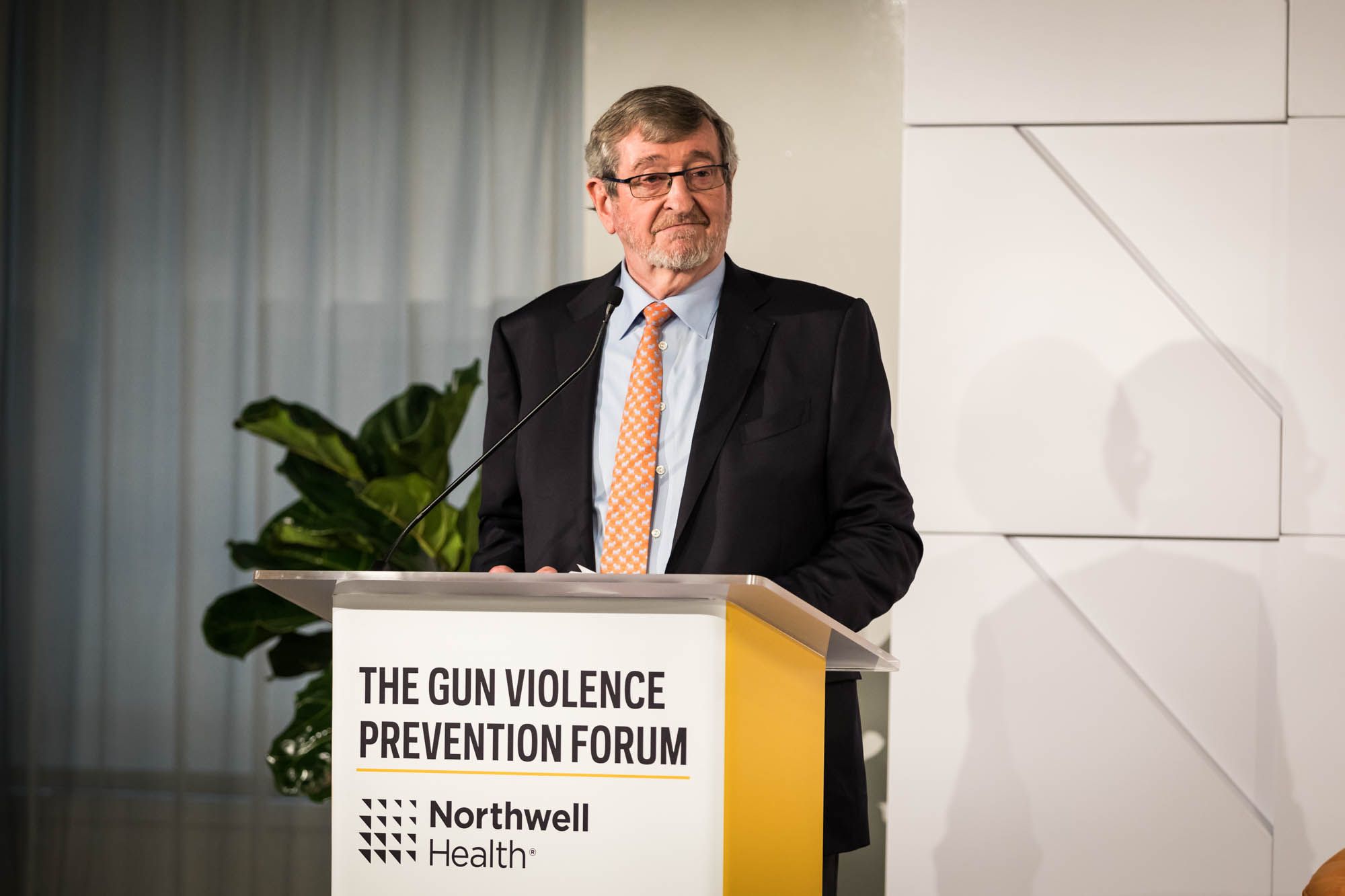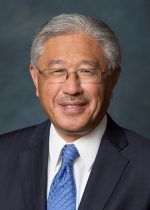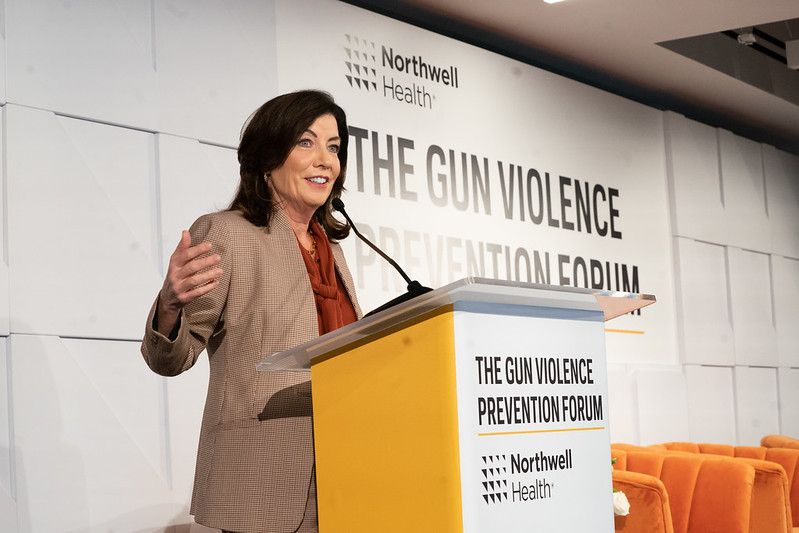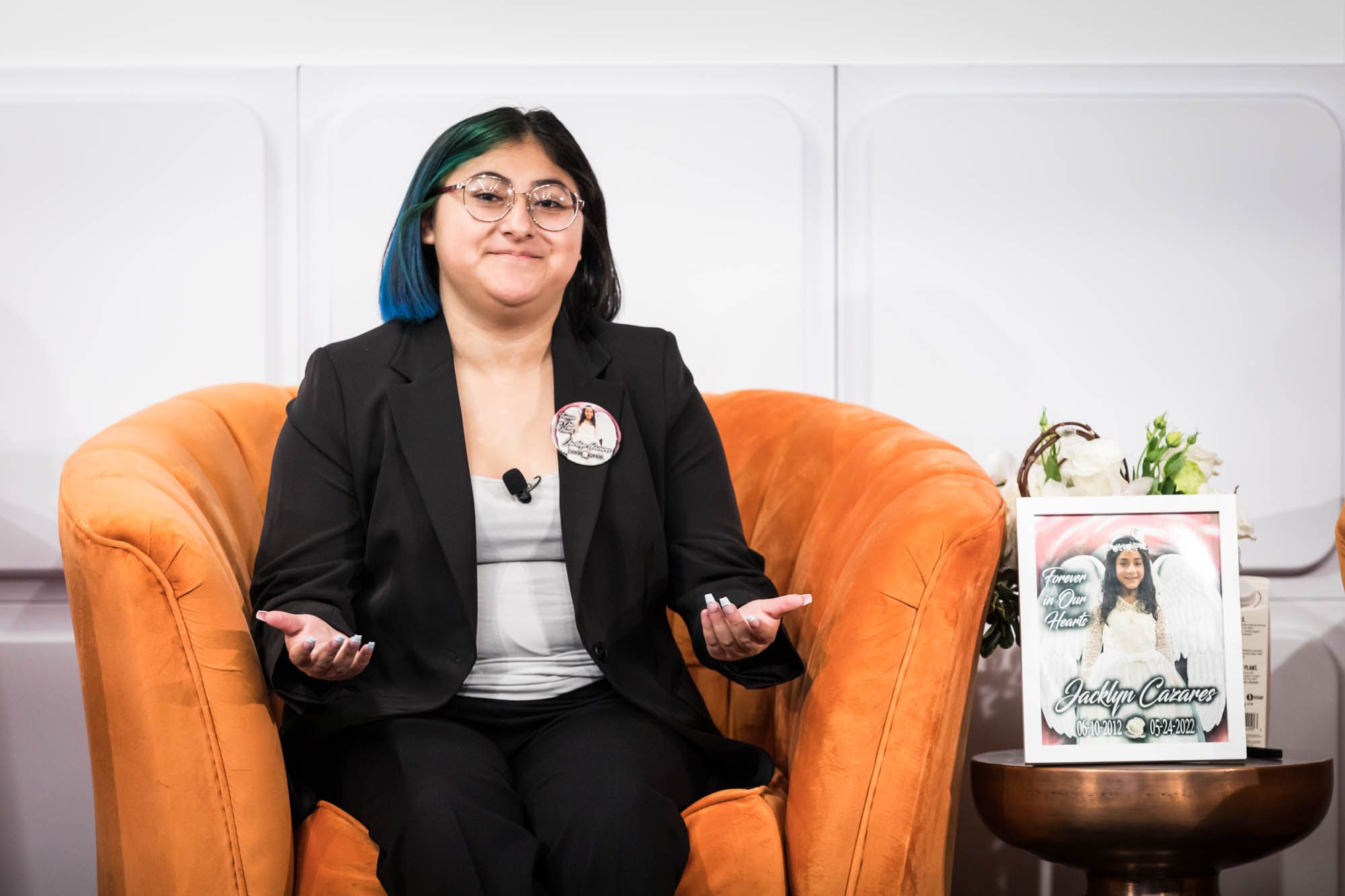Hospital leaders urged to join fight against gun violence
At a forum hosted by Northwell Health, health leaders, advocacy groups, and elected officials said hospitals and health systems must take a greater role on this public health threat.
Michael Dowling, CEO of Northwell Health, speaks at a forum on preventing gun violence, hosted by Northwell Health. (Photo by Kelly Williams, used with permission)

At the beginning of a forum on gun violence, Michael Dowling talked about the progress in encouraging others inside the healthcare industry to tackle the problem.
Dowling, the chief executive officer of Northwell Health, said a group of 50 hospital CEOs have come together to form a newly created task force against gun violence. Five years ago, Dowling said he reached out to some leaders and was met with silence or resistance.
“I was told by many, too dangerous,” Dowling said. “It’s the third rail. My board will be upset. I’ve got NRA members on my board."
Northwell Health hosted a forum on gun violence Tuesday, including leading figures in healthcare, advocates for victims of gun violence, and government officials.
Dowling encouraged healthcare leaders to stand up and make it clear that gun violence is a public health threat, and that hospitals and health systems must be part of the solution.
“Leadership is about inspiration,” Dowling said. “It’s about leading, not following. It’s about education. It’s about increasing awareness. It’s about taking positions that can be troublesome, maybe even dangerous. But that’s what leadership does.”
“Many are involved in this, but many are not,” he added.
The forum was designed to motivate healthcare leaders to get more involved.
Throughout the day of panel sessions, participants discussed the need for more engagement, more data, greater community involvement, and more urgency.
“It’s about politics, but it’s also about poverty,” Dowling said. “It's about mental health. It’s about dependency. It’s about neighborhoods that have been unattended. But that should not derail us. That should not slow us down.”
Hospitals have also seen gun violence on their own campuses, including fatal shootings at medical centers in Texas and Oklahoma last year.
‘We are really fed up’
America’s firearm death rate in 2021 reached the highest point in nearly three decades. There were nearly 49,000 deaths tied to firearms in 2021, according to the Centers for Disease Control and Prevention.
Victor Dzau, president, National Academy of Medicine

Victor J. Dzau, president of the National Academy of Medicine, discussed the need for a multi-systems approach to attack gun violence, similar to approaches used to battle smallpox, HIV and other public health threats.
Dzau also bemoaned the lack of data, largely due to Congress refusing to fund gun violence research for about 20 years. In the last few years, Congress has financed gun violence studies, but Dzau said much more data is needed to understand the unmet social needs, structural racism and other factors leading to so many deaths.
“We need a really comprehensive approach, a systems approach, to getting that information,” Dzau said.
“We are really fed up, as you all are, and want to continue working in that area.”
Megan L. Ranney, deputy dean at the Brown University School of Public Health, said researchers need far more data on gun deaths and those who are injured by firearms. Due to years without federal funding on gun violence, she said, “We are unbelievably limited.”
“We know so little about the scope of this epidemic or its after-effects,” she said.
Advocates also talked about the need to normalize conversations about gun safety.
Northwell Health introduced a PSA last September to draw attention to unlocked firearms, saying that only 30% of gun owners with kids store their firearms safely. In the ad, a family drops off their child with neighbors and, upon hearing the roar of a tiger, ask if the tiger will be locked up. The ad’s tagline: “Doesn’t kill to ask.” (Here's the PSA. The story continues below.)
The storage of firearms is a critical issue that could make a real difference in saving lives, said Steven Dettelbach, director of the Bureau of Alcohol, Tobacco, Firearms and Explosives, who appeared virtually.
Between 2017 and 2021, more than 1 million guns were reported as stolen from private individuals. Reminding law-abiding citizens to safely store their firearms is a solution to a national problem, he said.
“They don’t want their guns stolen,” Dettelbach said.
New York Gov. Kathy Hochul speaks at Northwell Health's forum to prevent gun violence, Tuesday, Feb. 28. (Photo: New York governor's office)

Recognizing public support
Twenty years ago, household gun ownership was declining, said Nina Vinik, founder & executive director of Project Unloaded. Now, Vinik said people are buying into the myth that guns make us safer. Four in 10 adults say they live in a household with a gun, according to the Pew Research Center.
While it may seem like gun culture is an intractable part of American life, Vinik contends it’s actually a fairly new phenomenon.
She also talked about how her group is concentrating on reaching out to young people, who have grown up with school shootings and other mass shootings, as being key to bringing about a shift.
“We’re confident young people are going to be the ones to change that culture,” Vinik said.
Panelists urged the audience, including healthcare leaders, that gun violence isn’t as polarizing a topic as they may perceive.
Sen. Chris Murphy, a Connecticut Democrat, has been trying to convince Congress to pass a law expanding background checks of gun purchases. While he still hasn’t been able to get a bill through Congress, he cites polls showing strong support for background checks. A Pew Research Center survey found 81% of American support background checks for private gun sales and gun show sales.
“You take zero political risk, as a healthcare provider or a business, by standing up for universal background checks in this country,” Murphy said.
While he noted business leaders can look at the loss of talent due to gun violence, healthcare leaders need to deal with gun violence as a public health threat.
“I just think healthcare leaders have a moral obligation to address this issue,” Murphy said.
New York Gov. Kathy Hochul, who appeared at the event, touted progress in her state in addressing gun violence.
In January 2023, New York police departments participating in an initiative to reduce gun violence reported 50 shooting incidents with injury, the lowest total in one month since March 2020. She also pointed out changes to the state’s Red Flag law are keeping more firearms from those at risk of hurting others, or themselves.
“I’m going to continue treating gun violence as the public health crisis that it is,” Hochul said.
Jazmin Cazares, the sister of Jackie Cazares, a 9-year-old girl who was among the 21 victims killed in the school shooting in Uvalde, Texas, spoke at Northwell Health's forum on gun violence prevention. (Photo by Kelly Williams, provided by Northwell Health)

‘Don’t give up the fight’
Joseph V. Sakran, a trauma surgeon with Johns Hopkins Medicine and the moderator of a panel, is also a survivor of gun violence.
Sakran was nearly killed when struck by a stray bullet while he was a senior in high school. He talked about the importance of acknowledging that gun violence is having a disproportionate effect on communities of color.
Noting other survivors and loved ones affected by gun violence, Sakran also offered a reminder that victims and their loved ones aren’t just statistics. He also implored others to get involved.
“You have the ability to be part of that change,” Sakran said. “For far too long, the burden of this problem has been placed on the shoulders of a few people.”
Nicole Hockley, co-founder & CEO of Sandy Hook Promise, lost her son Dylan, who was killed in his first-grade classroom at Sandy Hook Elementary School in 2013. On Dec. 14, 2012, 20 children and six educators were killed.
At the forum, Hockley described how she put her two sons, Dylan and Jake, on the bus to school, and only one son came home.
Hockley said it was “awesome” that 50 healthcare leaders are stepping up for gun violence, but encouraged others to follow suit.
“It takes us working together," she said.
She also talked about the unique role hospitals and health systems can play, because in addition to treating victims, they also are seeing those who may be showing warning signs of violence.
“You’re seeing people before they get to that stage,” Hockley said.
The final panel featured Gloria Cazares, the mother of Jackie Cazares, a 9-year-old girl who was among the 21 victims killed in the school shooting in Uvalde, Texas, and Jazmin Cazares, Jackie’s sister. Their cousin, Annabell Rodriguez, was also among those killed.
“Cherish those moments with your kids,” Gloria Cazares said.
Jazmin recalled her sister as “a sassy little girl,” who was 9 but acted 17. “You just want your kids to grow up,” Jazmin said. “So do something about it.”
“Don’t give up the fight,” she told the audience. “I’m glad I’m here but at the same time I wish I wasn’t here. Don’t wait until it's you up here.”
Telehealth faces a looming deadline in Washington | Healthy Bottom Line podcast
February 12th 2025Once again, the clock is ticking on waivers for telemedicine and hospital-at-home programs. Kyle Zebley of the American Telemedicine Association talks about the push on Congress and the White House.